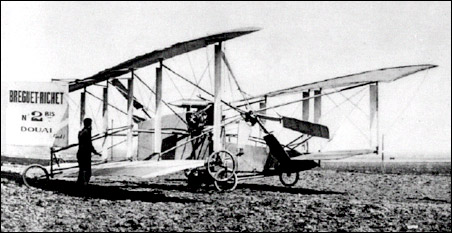
| Breguet-Richet Gyroplane No.2 1907 |  |
 |

| Breguet-Richet Gyroplane No.2 1907 |  |
 |
|
Helicopter-aeroplane, combining the principles of the lifting screw with the aeroplane pure and simple. The screws are two in number, and are placed at an angle of 40° to the vertical between the front and rear biplanes. They are driven by bevel gearing from a 50hp 8-cylinder Antoinette engine placed transversely, and are stated to give a starting lift of 300kg with a horizontal pull of 250kg at 300 r.p.m. Each screw has four flexible blades, and is 4.3m in diameter. Of the two main planes, the biplane at the rear has a spread of 14m, while the monoplane in front is 10m across; together (and with a few other smaller planes) a total of 60 sq. metres surface is provided. The rudder is behind, and the elevator in front beneath the fixed monoplane. Between the main plane are two horizontal steering planes, which twist in an inverse sense, and are controlled by a pedal. The machine weighs 550kg, and has been constructed at Douai by M. Breguet; its frame is made entirely of steel. It is very large and looks cumbersome, but is not very heavy for its dimensions. "Flight", 9 January 1909
In 1908 the Breguet-Richet collaboration produced a No.2 Gyroplane, powered by a 55hp Renault engine and having two forward-tilting 2-blade rotors with a diameter of 7.85m and, in addition, fixed wings giving an extra 50m2 of lifting surface. This machine made a number of successful flights in the summer of 1908, but was severely damaged in a 'heavy' landing on 19 September. In rebuilt form as the No.2bis it was displayed statically at Paris in December 1908 and made one test flight in the following April, but a month later the Breguet premises were wrecked by a hurricane. This, and the shortage of contemporary engines with an adequate power/weight ratio, caused Breguet to abandon rotary-winged development until the appearance of the Breguet-Dorand design in the 1930s. K.Munson "Helicopters And Other Rotorcraft Since 1907", 1968
|